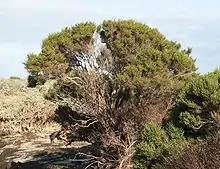Tecticornia arbuscula
Tecticornia arbuscula, the shrubby glasswort or scrubby samphire,[2] is a species of plant in the family Amaranthaceae, native to Australia. It is a shrub that grows to 2 metres in height, with a spreading habit. It has succulent swollen branchlets with small leaf lobes.[3][4]
| Shrubby glasswort | |
|---|---|
 | |
| Scientific classification | |
| Kingdom: | Plantae |
| Clade: | Tracheophytes |
| Clade: | Angiosperms |
| Clade: | Eudicots |
| Order: | Caryophyllales |
| Family: | Amaranthaceae |
| Genus: | Tecticornia |
| Species: | T. arbuscula |
| Binomial name | |
| Tecticornia arbuscula | |
| Synonyms | |
| |
The species occurs on shorelines in coastal or estuarine areas or in salt marshes, especially marshes subject to occasional inundation by the ocean. It has a patchy distribution across south coastal Australia, occurring in southern Western Australia, South Australia, Victoria, New South Wales and Tasmania.[3][4][5]
Seeds of the species are enclosed in a hard, vaguely pyramid-shaped pericarp which reveal 1.5 mm long, narrow seeds. these seeds appear as golden brown, transparent and unornamented.[6]
Originally published by Robert Brown under the name Salicornia arbuscula, it was transferred into Sclerostegia by Paul G. Wilson in 1980, before being merged into Tecticornia in 2007.[1]
References
- "Tecticornia arbuscula". Australian Plant Name Index (APNI), IBIS database. Centre for Plant Biodiversity Research, Australian Government.
- "Mainland Conservation Parks of Yorke Peninsula Management Plan 2009" (PDF). Department for Environment and Heritage. p. 14. Retrieved 6 December 2017.
- S.W.L. Jacobs. "New South Wales Flora Online: Tecticornia arbuscula". Royal Botanic Gardens & Domain Trust, Sydney, Australia.
- "Tecticornia arbuscula". FloraBase. Western Australian Government Department of Biodiversity, Conservation and Attractions.
- Wilson, Paul G. (1984). "Chenopodiaceae". Flora of Australia. Vol. IV. p. 306. (as Sclerostegia arbuscula)
- "Samphires of the Adelaide and Mt Lofty Ranges region" (PDF). Department for Environment and Heritage. p. 20. Retrieved 6 December 2017.